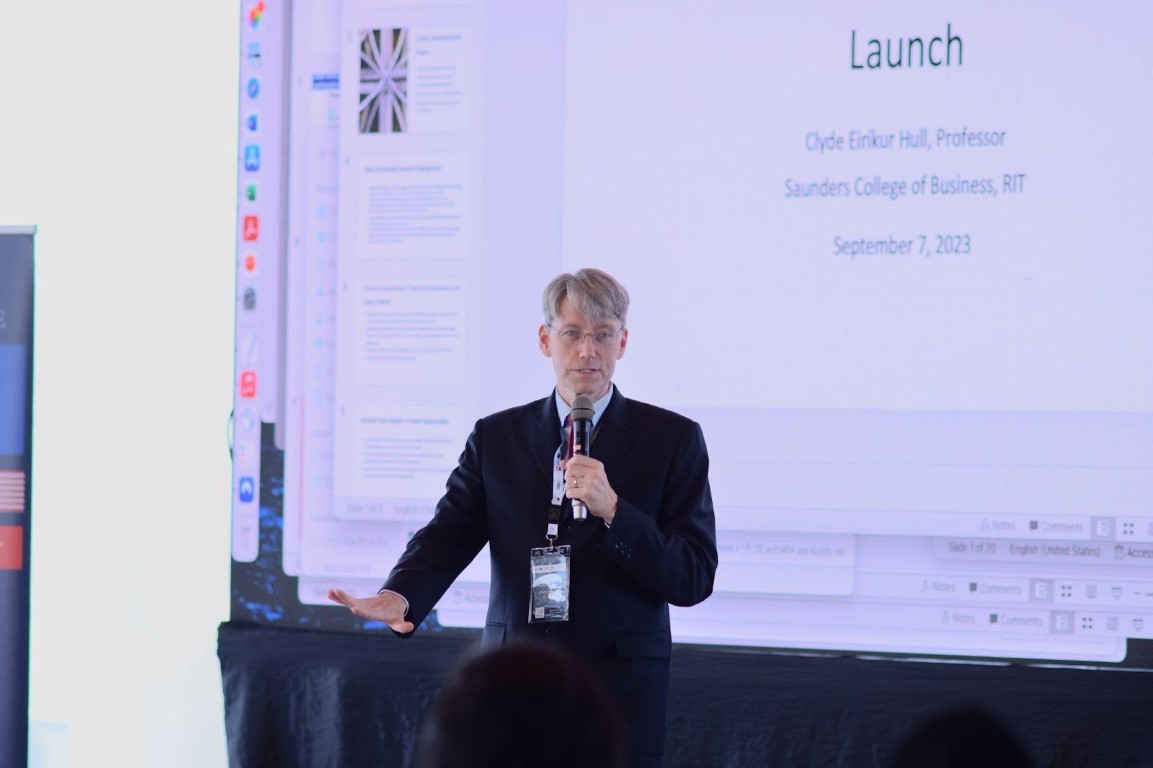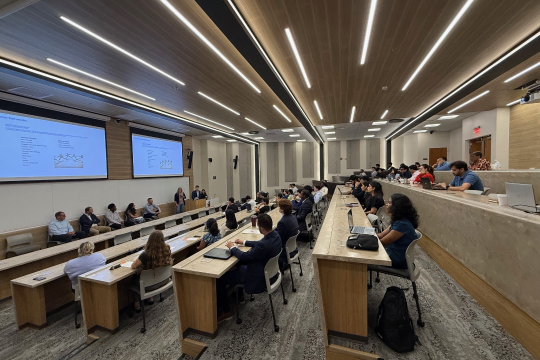Clyde Eiríkur Hull Takes Circular Economy Global, Kickstarting New Center in Sustainability
Clyde Eiríkur Hull, Ph.D., professor of management at Saunders College of Business at the Rochester Institute of Technology (RIT), is an internationally recognized expert in and proponent of circular economy (CE). CE is non-wasteful: nothing goes into a landfill because everything left over is reused by the business or sold to someone else. As Hull put it while kicking off his latest related grant at a symposium in Jakarta, “Everything that leaves your business is making you money. CE is high-tech, socially responsible, good for the environment—and profitable.”
Hull has successfully worked with circular economy incubators that educate businesses, help them identify and exploit opportunities, and train entrepreneurs to start circular economy businesses. Most recently, he, along with Saunders colleagues, has been exploring and promoting such opportunities in developing economies worldwide in Trinidad and Tobago, Jordan, and the Association of Southeast Asian Nations (ASEAN) region.
With colleagues Israa Thiab, visiting assistant professor in Saunders management department, Eric Williams,Ph.D., professor in RIT’s sustainability department, and Sherwyn Millette, Ph.D., student in RIT’s Golisano Institute for Sustainability, explored opportunities for circular economy incubators in Trinidad and Tobago. They discovered a large CE opportunity related to plastic use in that country. An article based on that work appeared in the Journal of Cleaner Production, “Challenges and opportunities in building circular-economy incubators: Stakeholder perspectives in Trinidad and Tobago.”
In Jordan, with generous support from the U.S. Embassy Hull recruited eight teams of entrepreneurs, primarily young women, trained them on CE entrepreneurship, and helped them develop their circular economy businesses to the point that they could be accepted into a local incubator, Queen Rania Center for Entrepreneurship (QRCE). The incubation will continue for a year, with the entrepreneurs expected to launch their full-fledged businesses within that period.
In all ten countries of the Association of Southeast Asian Nations (ASEAN) region, Hull is recruiting partners to deliver a curriculum based on that used in Jordan but modified to fit the ASEAN setting. Research directed in part by Hull has shown that there are opportunities for ASEAN entrepreneurs to make a significant profit by collecting e-waste and shipping it to extensive formal recycling facilities, such as one in Japan.
Hull’s team is supporting the Japanese government to smooth the way for ASEAN entrepreneurs to create CE businesses successfully. He is helped with a $1 million grant from the United States Department of State in partnership between the U.S.-ASEAN Science, Technology and Innovation Cooperation (STIC) Program and the U.S.-ASEAN Smart Cities Partnership (USASCP). The aim is to help incubators in ASEAN countries train their entrepreneurs on how to start CE businesses.
Hull’s work is the lead grant in the newly formed Competitive Sustainability Center, where Hull is working collaboratively with faculty in Golisano Institute for Sustainability. The center harnesses the talents and expertise of faculty in Saunders College and elsewhere at RIT “to help new and existing businesses, non-profits, and government agencies find and pursue competitive sustainability opportunities:”
- Supported by a grant from the Mother Cabrini Health Foundation and in partnership with the Rochester Hotel Association, Jerrie Hsieh and Muhammet Kesgin, faculty in the Saunders department of international hospitality and service innovation, have established The Hospitality Workforce Training Program for Refugees and Immigrants, which helps immigrants and refugees develop workforce skills in hospitality so they can find employment, secure a financial means of living, and re-establish their credentials.
- Games for Cybersecurity and Physical Resiliency Design is a project funded by the United States Military Academy (West Point), headed up David Schwartz, director of the School of Interactive Games and Media in the Golisano College of Computing and Information Sciences. The objective is to use “game design principles to develop resilience, including identifying threats, considering options, and working through solutions in a simulated environment.”
The Competitive Sustainability Center is currently operational and growing while planning its official public launch.
Now, Hull is coming full circle–from research to ambitious projects and finally to the classroom. In the fall of 2024, he will offer a course in circular entrepreneurship at RIT. “The class will be efficient and hands-on,” says Hull, “like the training we provide the entrepreneurs in Southeast Asia and the Middle East.” In this way, Hull will inform students and inspire them to meet some of today’s most pressing societal challenges.
Saunders faculty experts are always on to cutting-edge research. Learn more about research insights or find a faculty expert.













